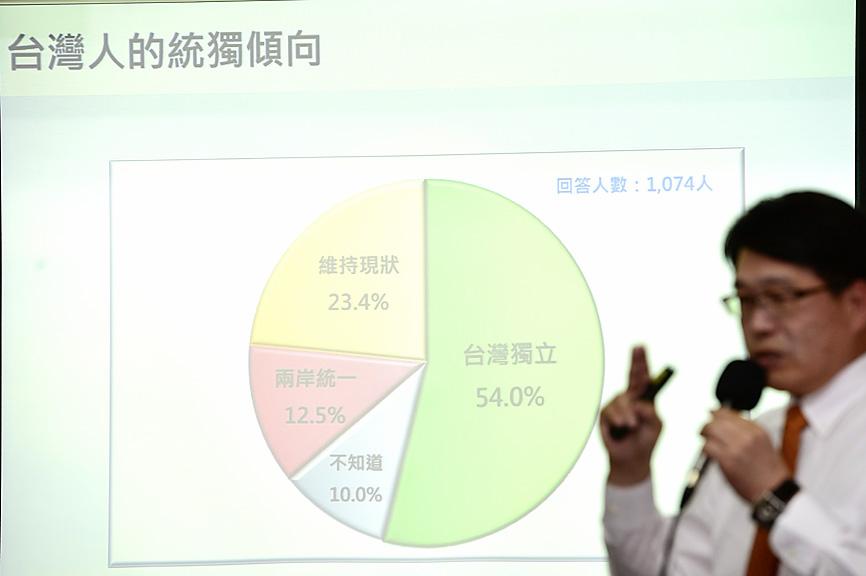Support for Taiwanese independence has spiked and most people do not fear that China would launch a military attack against the nation, the Taiwanese Public Opinion Foundation said at a news conference yesterday, citing a poll it conducted.
Among the people it surveyed, 54 percent said they support Taiwanese independence, 23.4 percent favored maintaining the “status quo,” 12.5 percent supported unification with China and about 10 percent gave no response or were unsure, the survey showed.
Of those who favored the “status quo,” 44.1 percent said they would back independence if pushed, 33.6 percent said they would continue to support the “status quo” and 22.3 percent said they would back unification, the survey showed.

Photo: George Tsorng, Taipei Times
Recalibrating the results using the breakdown of the “status quo” supporters showed that 64.4 percent of respondents ultimately supported Taiwanese independence, 7.9 percent backed the “status quo” and 17.8 percent favored unification with China, foundation chairman Michael You (游盈隆) said.
“In my research on public surveys on these issues over the past 30 years, this is the highest rate of support among Taiwanese for independence,” You said. “It is also the lowest figure for people supporting unification with China.”
The COVID-19 pandemic is an important factor pushing people to back independence, he said, adding: “I don’t know any other reasonable explanation for the results.”
Respondents were asked about Beijing having reiterated its resolve to invade Taiwan to deter movement toward independence and other threats, including Chinese aircraft intruding into Taiwan’s air defense identification zone.
Forty-three percent of respondents said they were afraid that China would attack Taiwan, while 55 percent said they are not concerned.
“Overall, 55 percent of people said that they do not fear that China would launch a military attack against Taiwan,” Taiwan Association for China Human Rights chairman Yang Sen-hong (楊憲宏) said. “This majority are courageous Taiwanese and the result is an interesting development.”
Asked about China approving national security legislation for Hong Kong and the British government proposing to permit 3 million Hong Kongers to apply for UK citizenship, 41.5 percent of respondents said that Taipei should follow London’s lead, while 50.5 percent said that the rules for Hong Kongers being granted Republic of China citizenship should not change.
Thirty-three percent said that the Council of Grand Justices’ Constitutional Interpretation No. 791, which effectively decriminalized adultery, was a good decision, while 60 percent disagreed with the ruling.
The poll was conducted on Monday and Tuesday last week among Taiwanese aged at least 20, collecting 1,074 valid responses. It has a margin of error of 2.99 percentage points.

Alain Robert, known as the "French Spider-Man," praised Alex Honnold as exceptionally well-prepared after the US climber completed a free solo ascent of Taipei 101 yesterday. Robert said Honnold's ascent of the 508m-tall skyscraper in just more than one-and-a-half hours without using safety ropes or equipment was a remarkable achievement. "This is my life," he said in an interview conducted in French, adding that he liked the feeling of being "on the edge of danger." The 63-year-old Frenchman climbed Taipei 101 using ropes in December 2004, taking about four hours to reach the top. On a one-to-10 scale of difficulty, Robert said Taipei 101

A preclearance service to facilitate entry for people traveling to select airports in Japan would be available from Thursday next week to Feb. 25 at Taiwan Taoyuan International Airport, Taoyuan International Airport Corp (TIAC) said on Tuesday. The service was first made available to Taiwanese travelers throughout the winter vacation of 2024 and during the Lunar New Year holiday. In addition to flights to the Japanese cities of Hakodate, Asahikawa, Akita, Sendai, Niigata, Okayama, Takamatsu, Kumamoto and Kagoshima, the service would be available to travelers to Kobe and Oita. The service can be accessed by passengers of 15 flight routes operated by

Taiwanese and US defense groups are collaborating to introduce deployable, semi-autonomous manufacturing systems for drones and components in a boost to the nation’s supply chain resilience. Taiwan’s G-Tech Optroelectronics Corp subsidiary GTOC and the US’ Aerkomm Inc on Friday announced an agreement with fellow US-based Firestorm Lab to adopt the latter’s xCell, a technology featuring 3D printers fitted in 6.1m container units. The systems enable aerial platforms and parts to be produced in high volumes from dispersed nodes capable of rapid redeployment, to minimize the risk of enemy strikes and to meet field requirements, they said. Firestorm chief technology officer Ian Muceus said

MORE FALL: An investigation into one of Xi’s key cronies, part of a broader ‘anti-corruption’ drive, indicates that he might have a deep distrust in the military, an expert said China’s latest military purge underscores systemic risks in its shift from collective leadership to sole rule under Chinese President Xi Jinping (習近平), and could disrupt its chain of command and military capabilities, a national security official said yesterday. If decisionmaking within the Chinese Communist Party has become “irrational” under one-man rule, the Taiwan Strait and the regional situation must be approached with extreme caution, given unforeseen risks, they added. The anonymous official made the remarks as China’s Central Military Commission Vice Chairman Zhang Youxia (張又俠) and Joint Staff Department Chief of Staff Liu Zhenli (劉振立) were reportedly being investigated for suspected “serious